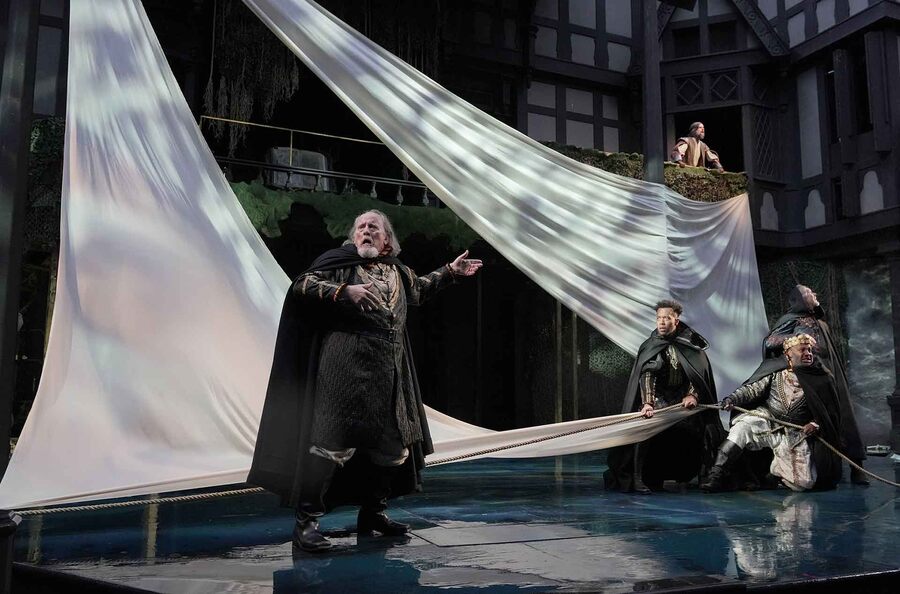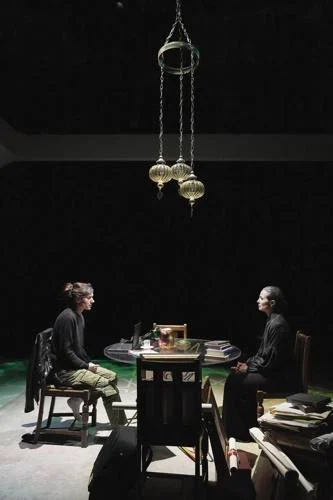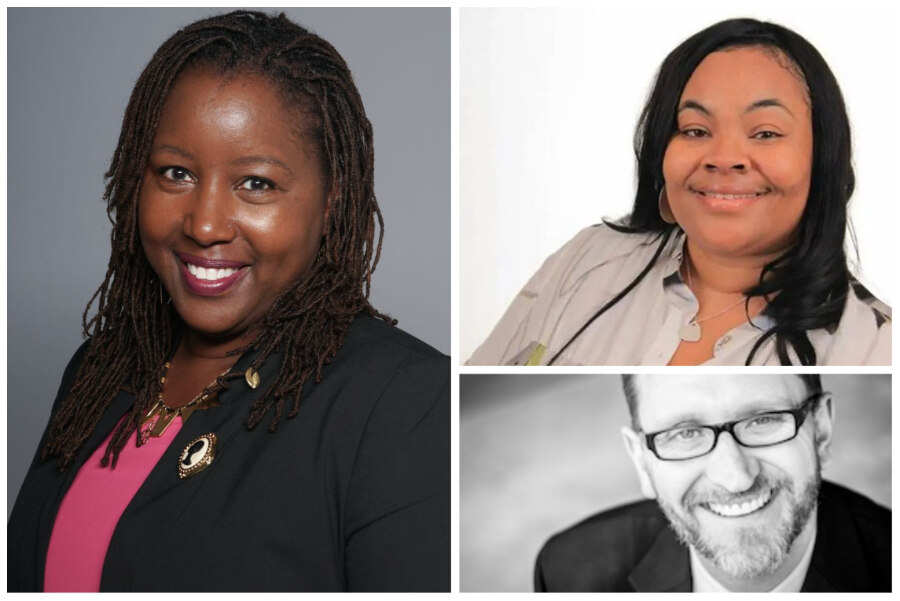ASHLAND, ORE.: There’s no getting around it, Oregon Shakespeare Festival (OSF) had a rough 2022. Crucial summer performances were canceled due to COVID, the now regular wildfire season took its toll, overall attendance was down, and, to make things egregiously worse, artistic director Nataki Garrett received death threats and had to travel with a security detail.
As the influential nonprofit theatre considered its 2023 season and future, it was clear that changes would be needed, and now they’ve come. As part of an overall downscaling, which has included cutbacks in programming, a leadership restructuring has been announced. Executive director David Schmitz, who joined the company near the beginning of the pandemic, will step down, as will development director Amanda Brandes. Artistic director Garrett will take on the role of interim executive artistic director, which gives her oversight of company’s artistic, development, and marketing departments. Meanwhile Anyania Muse—hired last summer as managing director of IDEA People, Culture, and Operations—will serve as interim chief operating officer, with oversight of finance, audience experiences, and education.
This restructuring comes with other announced changes: 12 layoffs and seven employee furloughs, as well as a stop or delay on hiring for 18 open positions. And this year’s season is down to six in-person productions, down from last year’s eight. (Pre-pandemic seasons at OSF included as many as 11 productions.)
“These past two and a half years have been among the most challenging times in OSF’s history—from COVID, to the Almeda Fire, to the ongoing racism and threats to members of our community, to inflationary challenges,” Schmitz said in a press release. “These years have also been rewarding because of the opportunity I had to get to know and witness the incredibly talented people who dedicate their lives to this company. It has been my great privilege to work alongside Nataki and with such an exceptionally talented and dedicated staff and board.”
“I am very grateful to David for all the work he’s done,” Garrett added in a statement. “I will be forever thankful that David was fearlessly optimistic from his very first day working to bring OSF forward to vitality while celebrating its glorious past.”
The release also reported on steps OSF already took throughout the 2022 season to offset structural deficits and the pandemic’s impact on operational costs, investments, ticket sales, and donations, and noted some of the funds it has in place to stabilize for the future: a $10 million multi-year grant from the Hitz Foundation, and $4.25 million the OSF board has decided to release from its endowment for operating expenses. The festival has announced a Restructure, Reframe, and Revitalize (3Rs) Strategy, which will focus the next few years on shifting and modernizing administrative systems that no longer serve the organization, including finance, information technology, human resources, marketing, and development.
I spoke to Garrett last night about the challenges she’s faced and the adjustments she’s made. She touched on themes we spoke about when she was hired, and again at the height of the pandemic, and sounded remarkably upbeat, resolute, and clear that she’s in this for the duration.
ROB WEINERT-KENDT: A lot has changed since we last spoke. Is this staff restructuring part of a larger pullback you began last year?
NATAKI GARRETT: Some of it is. We had to cancel two shows we’d planned for this season, which is not an easy conversation with artists when you have to let them know that we’re just not in a position fiscally to be able to afford the work. It’s not even because they were the most expensive shows; it’s because when you’re working in repertory and you truncate the number of weeks you offer, you actually remove tech weeks. So we just didn’t have enough tech time to be able to do all the shows that were in our list.
I can imagine that in rep there’s a domino effect, and when you take one piece out, other things fall out too.
Exactly right.
Now the leadership will be just you and Anyania, and the “interim” part of your titles seems to indicate this will be a period you’re going to go through, with a destination in sight, is that right?
That’s right, we’re implementing a strategy that allows us to first stabilize the organization, and then revitalize, restructure, and reframe the organization. You know, we’re in this pandemic, and every theatre is going through the same thing, which is that less than 50 percent of the audience is coming back. That’s a real thing. But the recovery gave me an opportunity to really look into the way our systems are running and to think about how those systems could run better. Are they efficient? Are they actually doing what we need them to do? And the answer to that, of course, is no. They’re not efficient, and they’re not running in the way that we need them to. They’re actually working at cross purposes to us as an organization. You have these systems that are antiquated, based on this model that was created by the Ford Foundation for nonprofit theatres in the 1950s, and they haven’t grown since then.
Can you give an example of what you mean?
You know, you might have three different financing systems because you’ve had three different finance directors over the last 25 years. So you have three different ways of tracking your resources. It’s just not efficient. And when you’re going to your funders and your donors, and you’re asking for resources, most of them want to give to the things that they can see, i.e., the plays. They don’t necessarily want to fund, you know, a new system for finance.
So when you say systems, you’re talking hardcore administrative stuff, not necessarily how you make the work, rehearsals, etc.
During the pandemic, because of the stoppage, I was actually able to really focus on redoing our some of our systems on the artistic side. So we right-sized on the artistic side coming into 2022. I even programmed the season by asking David to clarify what the container was—like, how much can we handle? And I would program my shows accordingly: I can’t do five musicals or a slate of Shakespeare plays, because those are the two most expensive things to produce. So I need one-person shows, three-person shows, some of these smaller pieces, new plays, to complement my Shakespeare plays or my musicals. I need a balance here, because that’s what we could afford to do, based on what the administrative side clarified was the container.

It’s true that the whole field is having problems with attendance and audiences not returning to pre-pandemic levels. It’s true to an extent of commercial theatre as well. But whereas New York tourism is rebounding, more or less, has theatre tourism to Ashland rebounded to what it was?
With us, the people are returning by flying to Ashland or driving up from Northern California or down from Portland or Seattle. It’s a destination town with a destination theatre. But as with the rest of the filed, our numbers have come in between 46 and 50 percent of people returning, which is the same return rate as most theatres across the country.
Our primary barrier is what I have been saying since I started this job at OSF, and had actually been saying it at the Denver Center too: This industry has relied so heavily on one generation of theatregoer. And that generation has been great to us; they have come to see our shows, they have given us their resources, they have put us in their wills, they have been the most supportive generation. They’re the backbone of our theatres. But because we put so much focus on one generation, we haven’t done enough work to focus on being as inviting and meeting the needs of all other generations. So if you’re a boomer, you feel like the theatre is for you. But if you are Gen X, you feel like the theatre is for your mom, and if you’re a millennial, you feel like the theatre is for your grandma, right? And the programming doesn’t have to be different. I feel like for the last 20 years, every artistic leader friend I have was like, “Oh, it’s programming. Let’s shift the programming toward more young shows, more Black shows or Asian shows, more identity-specific shows.” That’s not what it is; it actually has to do with the invitation.
Part of the reason why I think the industry is feeling this crunch is that when you start to invite people who are not in that predominant theatregoing group, that group—they signaled to me. I did a test by writing a couple of op eds about diversifying the audience, and the feedback was, “Your op ed is saying to me that I’m not invited to the theatre.” And I was like, “No, my op ed is saying that along with you, I’d like for your neighbor and your nephew all to come to the theatre.”
Right, it seems clear that there are some established audiences who, when you say you want to bring in new people, including people who look different than them or are different from them in other ways, they feel threatened. They feel like something is being taken away from them. And obviously, that’s been a big part of your story, unfortunately.
So far, that is exactly right.
And it’s not really about programming, is it?
It’s not. I mean, I have some people who would tell you different—they’ll tell you that I’m not doing enough Shakespeare, but in comparison to my predecessors, I’m actually doing as much or more. But I feel like I get it. If you have been catered to and centered for your entire life, all you need is for somebody to look away from you for five minutes, and all of a sudden, you feel like you’re out there by yourself; you don’t know what it means to share the space.
One of the things I’m focused on doing is I want to help my historical theatregoing audience learn how to be ambassadors. They came to the theatre and showed up in droves in the ’70s, ’80s, and ’90s, and the older generation that was sitting in those rooms at that time, especially in my theatre, which is 85 years old, they weren’t like, “Get out of here, we don’t want you here.” They weren’t saying, “Oh, the kids laugh in the wrong places.” They were like, “I’m glad you’re here, because it means that this will be here for another generation or two.” So I have to teach this generation that actually it’s about sharing the space. I’ve had patrons say to box office staff, “You know, I’d love to come back to OSF, but I used to be really sure about who I was sitting next to.” And I’m clear that they’re not even thinking about me sitting next to them, a 50-year-old Black woman. What they’re talking about is they don’t know anything about those new people—because they’re younger, they’re from a different culture or background or race. And they used to be sitting next to their friends. So how do you create a space in which the theatre is a public forum? It was meant for you to rub elbows with people you’ve never met before, and watch something and engage in something. I have to reteach the audience that that’s what we’re doing.

I got a really nasty note in the mail a week ago that said, “Go woke, go broke.” And he put his member number down next to his name and said, “Former member, 33 years.” I was like, let me analyze this language here for a moment: He doesn’t want to be awakened. He wants to be in the dark. He wants to be asleep. And if choose to wake people up at OSF then then we’re going to lose our resources—that’s the threat, you know, “Go broke.” And I think: Thank you for letting me know in advance. What I need to know now is, who’s coming behind you? And how do I make a connection to them? And then maybe you’ll come back?
All the pandemic did was accelerate something that was already moving, and all of the things that were actually failing in the American theatre, it moved them up very quickly. So we’re at the end of something where we thought we had a little bit more grace; we don’t have the grace. We actually have to be conscious of how our theatres are structured, and how they are actually going to be able to be able to survive. To my sister theatres who are still focused on this one generation of audience members, and who think that education programming is enough to bring people in, I have to say, our yield is about 13 percent of people who came to OSF as schoolchildren and come back one more time. And that’s for the last 50 years.
That’s not enough.
No, and that’s a systemic issue. We have to change the way we do that work. If people are not connected to this kind of work in their schools and their families don’t come, we become more and more disengaged.
Nataki, after all you’ve been through in the past year, you have every reason and right to be tired and upset. But it sounds like you’re in this to make it work. You even sound hopeful.
Well, I’m sad about David. I asked him to come to OSF, and I recognize that when you come in with the intention to help an organization move through something because the possibilities are so clear, and there’s so much that could happen, and when it doesn’t work the way you want it to or it takes too long—that part I wish had turned out different. But David raised $7.5 million going out the door, so the picture would have been bleaker if it wasn’t for his help and support. So yes, I’m very hopeful.
Rob Weinert-Kendt (he/him) is the editor-in-chief of American Theatre. rwkendt@tcg.org


